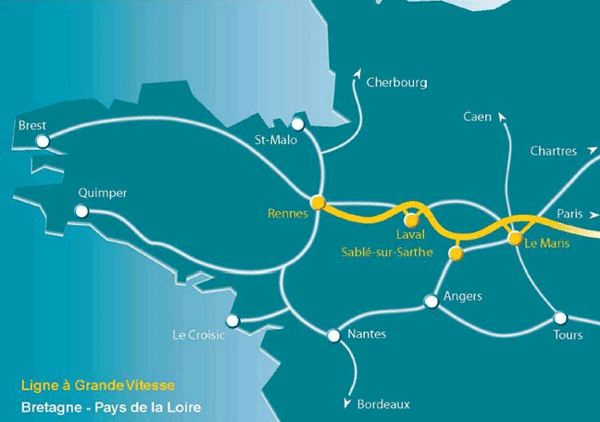RFF selects Eiffage for the public-private partnership (PPP) contract for the construction of the Brittany – Loire Valley high-speed line
Posted: 19 January 2011 | | No comments yet
Réseau Ferré de France has selected Eiffage as its “preferred bidder” for the publicprivate partnership contract to design, build, maintain and fund the Brittany – Loire Valley high-speed line…


Réseau Ferré de France has selected Eiffage as its “preferred bidder” for the publicprivate partnership contract to design, build, maintain and fund the Brittany – Loire Valley high-speed line.
As the extension to the existing high-speed line between Paris and Connerré (20 km to the East of Le Mans), the project should substantially enhance accessibility to the most westerly parts of France. It is consistent with the undertakings emerging from the Grenelle Environment Forum namely 2,000 km of new high-speed railway lines by 2020.
- 214 km of new lines, including 182 km of high-speed line
- Total investment budget : 3.4 billion euros
- More than 10,000 jobs created per year throughout the duration of the work site
- Cuts in trip times : 37 minutes between Paris and Rennes and 8 minutes between Paris and Nantes or even Angers.
- Completion of work : Autumn 2016.
Public-private partnership contract
For this high-speed line, which was declared in the public interest on 26 October 2007, the decision to opt for a public-private partnership contract dates back to December 2008.
Following negotiations with the three potential candidates (Bouygues TP, Eiffage, and Vinci Concessions), each submitted its final bid on 13 October last.
These bids were analysed in detail and, at an extraordinary meeting of the Board of Directors on 18 January, RFF named Eiffage as its preferred bidder. The bids were scored on the basis of the five criteria of cost, financial robustness, technical and environmental quality of the project, line construction times and involvement of SME.
The target is for the PPP contract to be signed in the first half of 2011.
Once the contract has been signed, the contractor will have the task of building and maintaining the new line for a total of 25 years and, in return, will receive public funding as well as allowances from RFF. Organisation of train movements will remain the responsibility of RFF.
The money to fund the project is being put up by all the public partners, in other words RFF together with (in equal proportions) the French State and the regional authorities : the Brittany Region with the départements of Finistère, Morbihan, Côtes d’Armor, l’Ille-et-Vilaine, Rennes Métropole and the Pays de Saint Malo, and the Pays de la Loire Region.
A high-speed line in the Brittany and Loire Regions
The new line will vastly improve access to the most westerly parts of France : it will slash 37 minutes off trip times between towns in these regions and Paris and will dock 8 minutes from trips between Paris and Nantes or even Angers.
The high-speed line will be a further link in the European network and will contribute to improving accessibility and boosting the attractions of the areas concerned. It is also part of an ambitious modernisation and development programme for the westernmost regions of France.
For Hubert du Mesnil, Chairman and Chief Executive of RFF : “The culmination of this largescale railway project will be one of the longest high-speed lines in Europe, a single 360-km link between Paris and western parts of France. It will be huge boon for the economic development and appeal of the regions concerned, which have joined forces with RFF in launching this major project. The candidate selected submitted a competitive bid that will enable the State, local authorities and RFF to meet their financial targets.”.


RFF:
As the pivot of the French railway system, Réseau Ferré de France develops, modernises and markets access to the rail network in accordance with the principles of regional, national and European territorial solidarity.
RFF is France’s second biggest investor and has a 1,200-strong workforce for a turnover of 3.4 billion euros. Over the 2008 – 2013 period, it is forging ahead with unprecedented programme of network modernisation, to the tune of 13 billion euros. In the aftermath of the Grenelle Environment Forum, RFF has the task of enforcing national new line development policy.
Over its 30,000 km of lines, RFF is responsible for providing fair and equal access to the French railway network for all its rail passenger and freight transport customers.
Stay Connected with Global Railway Review — Subscribe for Free!
Get exclusive access to the latest rail industry insights from Global Railway Review — all tailored to your interests.
✅ Expert-Led Webinars – Gain insights from global industry leaders
✅ Weekly News & Reports – Rail project updates, thought leadership, and exclusive interviews
✅ Partner Innovations – Discover cutting-edge rail technologies
✅ Print/Digital Magazine – Enjoy two in-depth issues per year, packed with expert content
Choose the updates that matter most to you. Sign up now to stay informed, inspired, and connected — all for free!
Thank you for being part of our community. Let’s keep shaping the future of rail together!



